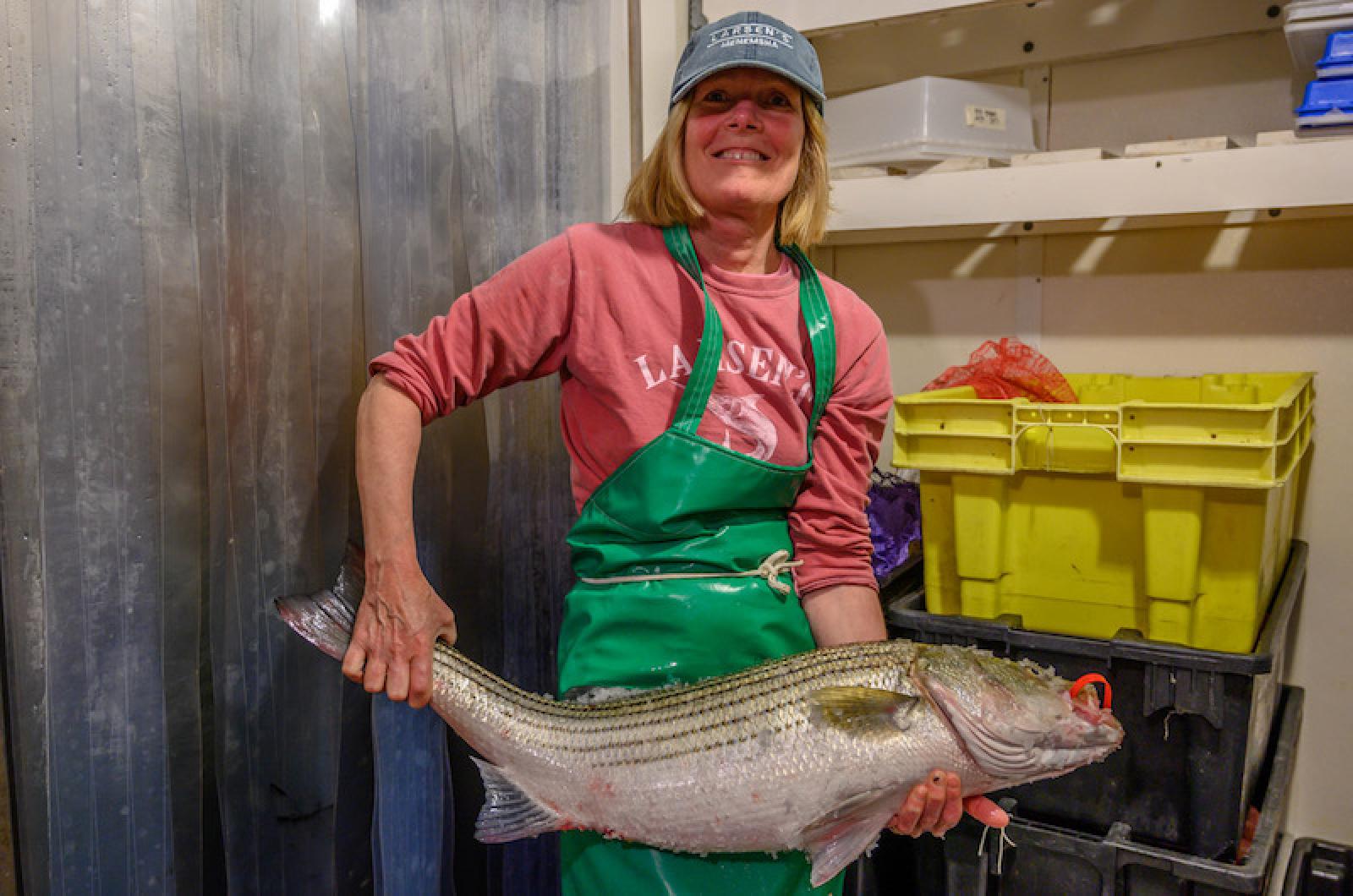By the end of the day Monday, the first day of the commercial striped bass season, the Menemsha Fish House had brought in 297 filleted pounds of the elusive — and profitable — fish.
Otto Osmers, a commercial fisherman and fishmonger at the Fish House, said it was an about average commercial day in terms of pounds of fish landed.
And he acknowledged that the season begins amid concern among fishermen and regulators over declining stocks.
Striped bass is a highly regulated fishery, especially in the commercial market. Fishermen with a permit are allowed to catch and sell the fish on Mondays and Thursdays. They have a bag limit of 15 fish per commercial day; the minimum commercial size is 34 inches.
The only added regulation this year is that fishermen are not allowed to gaff fish that are below legal size. Story Reed, state Division of Marine Fisheries permitting manager, said most fishermen have already adopted the practice of not gaffing smaller fish, so it was a matter of “putting it down on paper.”

In Massachusetts this year the commercial striped bass season will be capped at 869,813 pounds. The number is up from last year but represents a decrease from previous years. The season remains open until the quota is reached.
Last year the season never closed. The commercial fishery only reached 88 per cent of the 847,585 pound quota before the fish migrated south for the winter.
That result concerned many fishermen, and the concern has carried over into this commercial year. Typically the quota is reached by August or September. In 2012 the season ended a month after opening day.
Alex Friedman, a commercial fisherman out of Oak Bluffs, said environmental factors are having a clear impact on the fishery. “I believe that the problems with striped bass stocks are less due to a well regulated and limited commercial fishery than to rapidly changing environmental factors — and by that I mean climate change and an increased predation from seals,” he said.
One sign of a changing environment is the early arrival of bonito this year. The tropical fish usually arrives in late summer due to the warmer waters. This year the bonito have already arrived.
Michael Armstrong, chairman of the striped bass board for the Atlantic States Marine Fisheries Commission, cited a variety of other factors to explain why the 2018 quota was never reached.
He said the yearly haul correlates directly to the health and size of the class that spawned eight to 10 years prior. Those fish would just be coming into commercial size. According to Mr. Armstrong, there were a few weak classes in the mid-to-late 2000s.
“The biggest predictor of what’s in our waters is year class strength,” he said. “Year class strength is set by environmental conditions such as the salinity gradient . . . and rainfall in the spring.”
He said while the strength of the year classes tends to fluctuate, there are a few above average year classes from the early late 2000s and early 2010s which are just coming into maturity and should be ready to be fished this year.
“Last year was an anomaly and I think you’ll see the quota taken this year,” Mr. Armstrong said.
Nevertheless, he said the ASMFC is planning to institute new regulations for next year’s commercial season that he hopes will strengthen the 2020 year classes and beyond.
One rule will only allow circle hooks for recreational striped bass fishing. Circle hooks are more likely to hook into the lip of a fish than its gut, reducing the likelihood of the fish dying if it is released.
Mr. Armstrong said an estimated 13 million fish were released by recreational fishermen in 2018. The ASMFC estimates that nine per cent of those released fish will die.
“The mortality rate is significantly truncating the age structure,” he said. “We need to get a handle on reducing that nine per cent.”
The AMFS also hopes to pass a so-called slot policy, where fish over a certain size have to be released. The reason is that larger fish produce more eggs.
“If we don’t see the quota taken we will have to regroup and look at the reasons,” Mr. Armstrong concluded. “It’s all up in the air, and at this point we’re only speculating.”







Comments (23)
Comments
Comment policy »